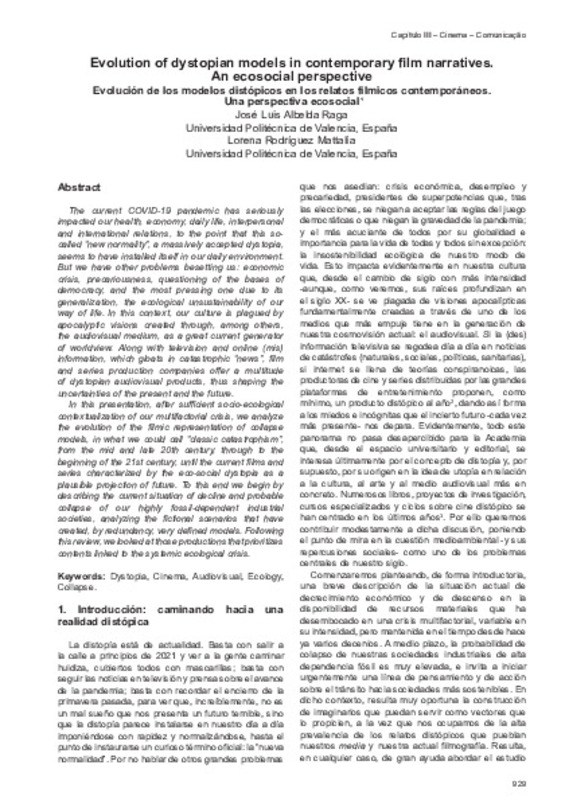JavaScript is disabled for your browser. Some features of this site may not work without it.
Buscar en RiuNet
Listar
Mi cuenta
Estadísticas
Ayuda RiuNet
Admin. UPV
Evolution of dystopian models in contemporary film narratives. An ecosocial perspective
Mostrar el registro sencillo del ítem
Ficheros en el ítem
| dc.contributor.author | Albelda Raga, José Luís
|
es_ES |
| dc.contributor.author | Rodríguez Mattalia, María Lorena
|
es_ES |
| dc.date.accessioned | 2022-09-28T18:02:09Z | |
| dc.date.available | 2022-09-28T18:02:09Z | |
| dc.date.issued | 2021-10-25 | es_ES |
| dc.identifier.uri | http://hdl.handle.net/10251/186682 | |
| dc.description.abstract | [EN] The current COVID-19 pandemic has seriously impacted our health, economy, daily life, interpersonal and international relations, to the point that this so-called ¿new normality¿, a massively accepted dystopia, seems to have installed itself in our daily environment. But we have other problems besetting us: economic crisis, precariousness, questioning of the bases of democracy, and the most pressing one due to its generalization, the ecological unsustainability of our way of life. In this context, our culture is plagued by apocalyptic visions created through, among others, the audiovisual medium, as a great current generator of worldview. Along with television and online (mis)information, which gloats in catastrophic ¿news¿, film and series production companies offer a multitude of dystopian audiovisual products, thus shaping the uncertainties of the present and the future.In this presentation, after sufficient socio-ecological contextualization of our multifactorial crisis, we analyze the evolution of the filmic representation of collapse models, in what we could call ¿classic catastrophism¿, from the mid and late 20th century, through to the beginning of the 21st century, until the current films and series characterized by the eco-social dystopia as a plausible projection of future. To this end we begin by describing the current situation of decline and probable collapse of our highly fossil-dependent industrial societies, analyzing the fictional scenarios that have created, by redundancy, very defined models. Following this review, we looked at those productions that prioritizes contents linked to the systemic ecological crisis | es_ES |
| dc.language | Español | es_ES |
| dc.publisher | Cineclube de Avanca | es_ES |
| dc.relation.ispartof | Avanca - Cinema (Online) | es_ES |
| dc.rights | Reconocimiento (by) | es_ES |
| dc.subject | Cine | es_ES |
| dc.subject | Documental | es_ES |
| dc.subject | Ecología | es_ES |
| dc.subject | Distopía | es_ES |
| dc.subject | Utopía | es_ES |
| dc.subject.classification | PINTURA | es_ES |
| dc.subject.classification | ESCULTURA | es_ES |
| dc.title | Evolution of dystopian models in contemporary film narratives. An ecosocial perspective | es_ES |
| dc.type | Artículo | es_ES |
| dc.identifier.doi | 10.37390/avancacinema.2021.a327 | es_ES |
| dc.relation.projectID | info:eu-repo/grantAgreement/AEI/Plan Estatal de Investigación Científica y Técnica y de Innovación 2017-2020/PID2019-107757RB-I00/ES/HUMANIDADES ECOLOGICAS Y TRANSICIONES ECOSOCIALES. PROPUESTAS ETICAS, ESTETICAS Y PEDAGOGICAS PARA EL ANTROPOCENO/ | es_ES |
| dc.rights.accessRights | Abierto | es_ES |
| dc.contributor.affiliation | Universitat Politècnica de València. Departamento de Escultura - Departament d'Escultura | es_ES |
| dc.contributor.affiliation | Universitat Politècnica de València. Departamento de Pintura - Departament de Pintura | es_ES |
| dc.description.bibliographicCitation | Albelda Raga, JL.; Rodríguez Mattalia, ML. (2021). Evolution of dystopian models in contemporary film narratives. An ecosocial perspective. Avanca - Cinema (Online). 1(2021):929-937. https://doi.org/10.37390/avancacinema.2021.a327 | es_ES |
| dc.description.accrualMethod | S | es_ES |
| dc.relation.publisherversion | https://doi.org/10.37390/avancacinema.2021.a327 | es_ES |
| dc.description.upvformatpinicio | 929 | es_ES |
| dc.description.upvformatpfin | 937 | es_ES |
| dc.type.version | info:eu-repo/semantics/publishedVersion | es_ES |
| dc.description.volume | 1 | es_ES |
| dc.description.issue | 2021 | es_ES |
| dc.identifier.eissn | 2184-4682 | es_ES |
| dc.relation.pasarela | S\464289 | es_ES |
| dc.contributor.funder | AGENCIA ESTATAL DE INVESTIGACION | es_ES |
| dc.subject.ods | 16.- Promover sociedades pacíficas e inclusivas para el desarrollo sostenible, facilitar acceso a la justicia para todos y crear instituciones eficaces, responsables e inclusivas a todos los niveles | es_ES |








